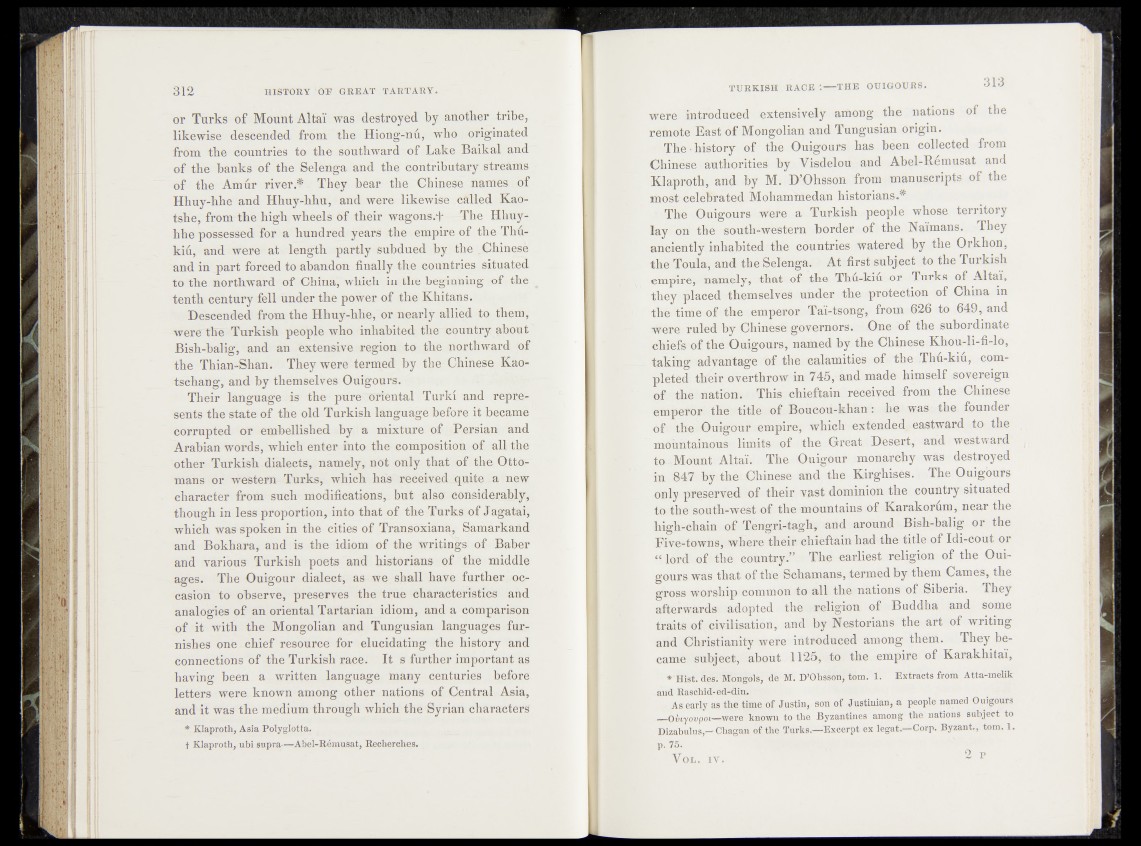
or Turks of Mount Altai was destroyed by another tribe,
likewise descended from the Hiong-nfi, who originated
from the countries to the southward of Lake Baikal and
of the banks of the Selenga and the contributary streams
of the Amtir river They bear the Chinese names, of
Hhuy-hhe and Hhuy-hhu, and were likewise called Kao-
tshe, from the high wheels of their wagons.f The Hhuy-
hhe possessed for a hundred years the empire of the Thti-
ki6 , and were at length partly subdued by the .Chinese
and in part forced to abandon finally the countries situated
to the northward of China, which in the beginning of the
tenth century fell under the power of the Khitans.
Descended from the Hhuy-hhe, or nearly allied to them,
were” the Turkish people who inhabited the country about
Bish-balig, and an extensive region to the northward of
the Thian-Shan. They were termed by the 'Chinese Kao-
tsehang, and by themselves Ouigours.
Their language is the pure “Oriental Turk! and represents
the state of the old Turkish language before it became
corrupted or embellished by a mixture of Persian and
Arabian words, which enter into the composition of all the
other Turkish dialects, namely, not only that of the Ottomans
or western Turks, which has 'received .quite jsl new
character from such modifications, but also' considerably*
though in less proportion, into that of the Turks of Jagatai,
which was spoken in the cities of Transoxiana, Samarkand
and Bokhara, and is the idiom of the Writings of Baber
and various Turkish poets and historians of the middle
ages. The Ouigour dialect, as we shall have further occasion
to observe, preserves the true characteristics and
analogies of an oriental Tartarian idiom, and a comparison
of it with the Mongolian and Tungusian languages furnishes
one chief resource for elucidating the history and
connections of the Turkish race. It s further important as
having been a written language many centuries before
letters were known among other nations of Central Asia,
and it was the medium through which the Syrian characters
* Klaproth, Asia Polyglotta.
t Klaproth, ubi supra-—Abel-Remusat, Recherches.
Were introduced extensively among the nations of the
remote East of Mongolian and Tungusian origin.
< The-history of the Ouigours has been collected from
Chinese authorities- by Visdelou and Abel-llémusat and
Klaproth, and by M. D’Ohsson from manuscripts of the
most celebrated M«bamhtedan historians.*
' The Ouigours were a Turkish people whose territory
lay; on the south-western border of the Naïmans. They
anciently inhabited the countries watered by the Orkhon,
the Toula, and the Selenga.| At first subject to the Turkish
empire, namely# 5that of the Thü-kiû or Turks of Altaï,
they placed themselves under the protection of China in
thé time of f-the emperor Tai-tsong^ froin626 to 649, and
Were ruled by Chinese governors. One of the subordinate
chiefs of the Ouigours, named by the Chinese Khou-li-fi-lo,
taking advantage of the calamities of i;he .Thu-kiu, completed
their overthrow in 745, and made himself sovereign
of the nation. This chieftain receife§hfrom the Chinese
emperor the title of Boucou-khan : 'he was then4ounder
of the Ouigour lempire, which extended;, eastward to the
mountainous limits^ of the Great Degbut^ and westward
to-Mount Altai. The Ouigour monarchy was destroyed
in 847 by the Chinese and the Kirghises. j The Ouigours
only preserved of their vast dominion the country situated
to the south-west of the mountains of Karakordm, near the
high-chain of Tengri-tagh, and around Bish-balig or the
Five-towns, where their- chieftain had the title, of Idi-éoüt or
“ lord of the country.TssSftThe eanbiest^rel^ion of the Ouigours
was that of the Schamans, termed by them Carnes,.the
gross worship common to all the nations of Siberia. They
afterwards adopted the religion of I Buddha and some
traits of civilisation, and by ■ IN"estorian s the art of writing
and Christianity were introduced among then». They became
subject, about 1125; to the empire of Karakhitai,
*• Hist. des. Mongols, de M. D’Óhssóiï; tom. 1. Extracts from Atta-mdik
and Raschid.ed-din.
As early as the time of Justin, son,'of Justinian, a people named^Qnigours
—Oiiyovpoi—were known to the Byzantines among the nations subject1 to
Dizabulus,— Chagan of the Turks.—Excerpt ex legat.—Corp. Byzant,, tom. 1.
p. 75. H I •
VOL. IV. _ ! ^ P